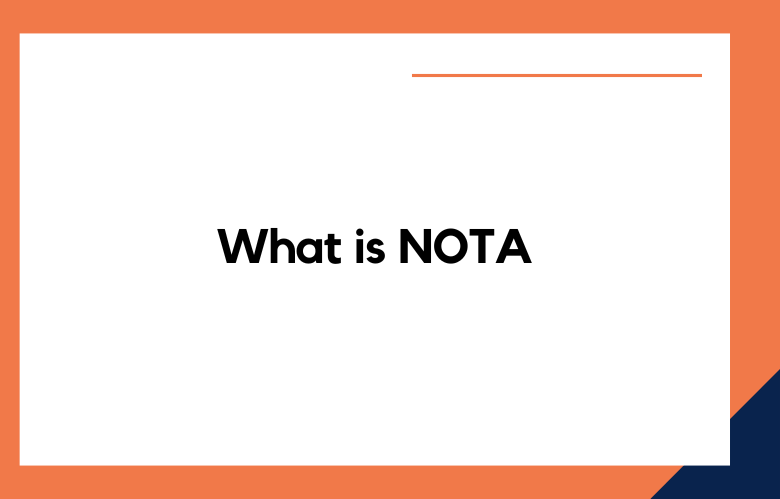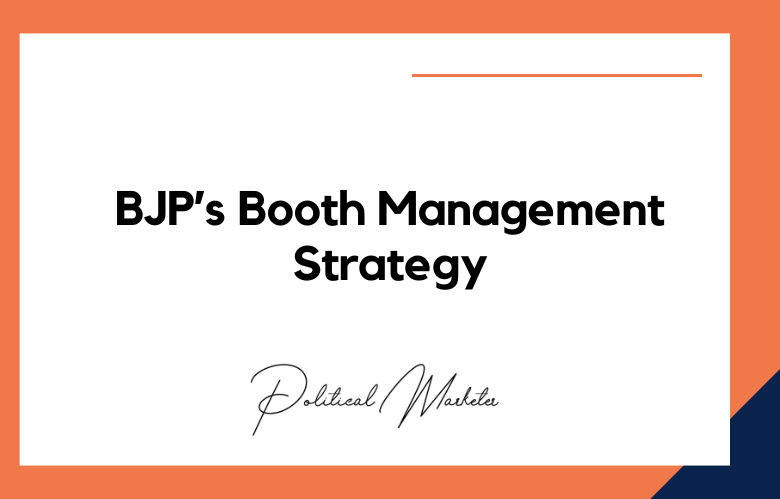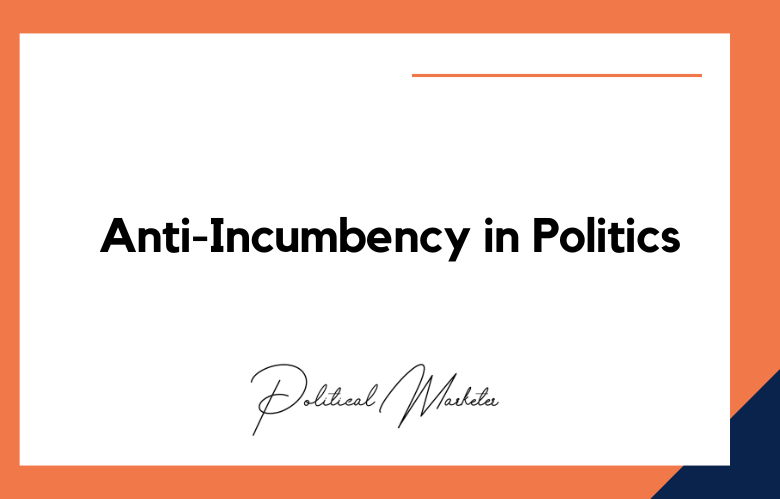NOTA stands for “None of the Above,” a voting option allowing citizens to express their dissatisfaction with the candidates on the ballot. When NOTA is available, voters can select it instead of voting for any listed candidates. A vote for NOTA indicates that the voter does not support any of the candidates and wishes to register their protest against the existing options.
What is NOTA?
The introduction of NOTA provides voters with an additional means of expressing their discontent with the political establishment or the quality of candidates presented for election. It is intended to uphold the principle of voter choice and strengthen democratic representation by acknowledging the legitimacy of dissenting voices.
However, it’s important to note that a vote for NOTA does not affect the election outcome in most electoral systems. Even if NOTA receives the highest number of votes, the candidate with the highest number is typically declared the winner. NOTA serves primarily as a symbolic gesture, signaling dissatisfaction with the available choices without impacting the final election results.
NOTA has been implemented in various countries to promote transparency, accountability, and the democratic right to express dissent. Its effectiveness and implications vary depending on each jurisdiction’s electoral system and legal framework.
Exploring the Impact of NOTA on the Election
Exploring the impact of NOTA (None of the Above) in elections unveils a nuanced dynamic that reflects voter sentiment, electoral participation, and the broader democratic process. While NOTA serves as a symbolic expression of dissatisfaction with available candidates, its impact on election outcomes and political discourse varies across different contexts.
First and foremost, NOTA provides voters with a legitimate avenue to voice their discontent with the existing political options. By choosing NOTA, voters signal their dissatisfaction with the quality or choices of candidates presented on the ballot. This can serve as a protest against perceived shortcomings in the electoral process, candidate selection, or party politics.
Additionally, NOTA on the ballot can incentivize political parties and candidates to improve the quality of their offerings and address voter concerns more effectively. The fear of losing to NOTA may prompt parties to field more credible candidates, engage in issue-based campaigning, and prioritize the needs and aspirations of the electorate.
Demystifying NOTA: Everything You Need to Know in 2024
In 2024, as citizens prepare to exercise their democratic rights, one aspect of the electoral process that continues to garner attention and curiosity is NOTA (None of the Above). NOTA, introduced as a reform measure to empower voters, allows individuals to reject all candidates contesting in an election if they find none suitable for office.
While NOTA does not directly affect the outcome of an election, its significance lies in its symbolic value as a mechanism for expressing dissatisfaction with the available choices.
As we delve into the intricacies of NOTA in the context of the upcoming elections, it becomes essential to demystify its purpose, impact, and implications for the democratic process. This exploration aims to comprehensively understand NOTA and its role in shaping electoral dynamics 2024.
The Rise of NOTA: A Closer Look at Voter Trends in 2024
The rise of NOTA (None of the Above) in contemporary elections reflects shifting voter attitudes, increasing demands for transparency, and a growing desire for meaningful political engagement. In 2024, as electoral landscapes evolve, it’s essential to look closely at voter trends surrounding the adoption and utilization of NOTA as a voting option. One notable trend is the increasing use of NOTA to protest or express dissatisfaction with mainstream political offerings.
In an era of disillusionment with traditional politics and heightened awareness of corruption and inefficiency, voters are turning to NOTA to voice their discontent. This trend highlights a growing demand for alternative candidates, policies, and systems that better align with the electorate’s values and aspirations.
Additionally, the rise of NOTA reflects a broader trend towards greater individualism and independence in voting behavior. As citizens become more empowered and informed through digital platforms and social media, they are less inclined to align with traditional party structures or adhere to conventional voting patterns.
NOTA allows voters to exercise autonomy and assert their preferences outside established party lines, contributing to a more diverse and fragmented political landscape.
Unpacking the Significance of NOTA in the Political Landscape of 2024
In the political landscape 2024, NOTA (None of the Above) looms large as a symbol of voter empowerment and dissatisfaction with traditional political options. As citizens increasingly demand accountability and transparency from their elected representatives, NOTA emerges as a powerful tool for expressing discontent with the available choices on the ballot.
In an era of growing disillusionment with mainstream politics and establishment parties, NOTA allows voters to register their protest and demand better alternatives. Its presence on the ballot reminds political parties and candidates that they must earn the trust and support of the electorate through genuine representation and accountability.
Moreover, NOTA plays a crucial role in fostering a culture of participatory democracy, where citizens are actively engaged in the electoral process beyond merely casting their votes. By empowering individuals to voice their dissatisfaction with the status quo, NOTA encourages a more robust and inclusive political discourse, driving parties and candidates to address the concerns and aspirations of all segments of society.
NOTA: A Game-Changer in the Election Cycle
NOTA (None of the Above) has emerged as a potential game-changer in the electoral cycle, introducing a new dynamic that challenges traditional political participation and representation notions. By allowing voters to express dissatisfaction with available candidates, NOTA can influence electoral outcomes, shape political discourse, and hold political parties and candidates accountable.
One way NOTA can be a game-changer is by catalyzing electoral reform. The presence of NOTA on the ballot sends a clear message to political stakeholders that voters demand better choices and higher governance standards. In response, political parties may be compelled to nominate more credible candidates, prioritize issues that resonate with the electorate, and adopt measures to improve transparency and accountability in the electoral process.
Moreover, NOTA can potentially mobilize disengaged or disillusioned voters who may otherwise abstain from voting altogether. By offering a legitimate option to express dissatisfaction, NOTA gives these voters a voice and a stake in the political process. This increased participation can have significant implications for election outcomes, especially in closely contested races with narrow margins of victory.
Understanding the Legal Implications of NOTA for Voters in 2024
In 2024, understanding the legal implications of the “None of the Above” (NOTA) option for voters is essential for exercising one’s democratic rights effectively. NOTA allows voters to reject all candidates contesting in an election if they find none suitable. Here are the critical legal implications of NOTA for voters in 2024:
Right to Express Dissatisfaction
NOTA provides voters a legitimate means to express dissatisfaction with the available candidates. By choosing NOTA, voters can signal their discontent with the political options.
Confidentiality of Vote
The choice of NOTA is treated confidentially, just like any other vote cast. Voters can select NOTA without fear of reprisal or judgment, ensuring the secrecy and integrity of the electoral process.
Effectiveness of NOTA
While NOTA allows voters to register their dissatisfaction, it does not affect the election’s outcome directly. Even if NOTA receives the most votes, the candidate with the most votes among the contesting candidates is declared the winner.
Symbolic Value
NOTA carries symbolic value by highlighting voter dissatisfaction and calling attention to the quality of candidates and the electoral process. Many NOTA votes can prompt political parties and policymakers to introspect and improve candidate selection processes.
Legal Standing
NOTA was introduced in India following a Supreme Court ruling in 2013, which recognized the right of voters to reject all candidates in an election. The Election Commission of India implemented NOTA as an option for electronic voting machines (EVMs) and ballot papers.
Future Reforms
The presence of NOTA on the ballot reflects ongoing efforts to enhance democratic processes and empower voters. Based on feedback from voters who choose NOTA, continued discussion and advocacy for electoral reforms may lead to further improvements in the electoral system.
Encouraging Voter Participation
NOTA can encourage voter participation by providing an option for voters who may otherwise abstain from voting due to dissatisfaction with the available candidates. It underscores the importance of civic engagement and voter turnout in democratic societies.
Awareness and Education
Voters need to be aware of the implications of choosing NOTA and understand that while it allows them to express dissatisfaction, it does not directly impact election results. Education campaigns can help clarify the role and significance of NOTA in the electoral process.
Understanding the legal implications of NOTA empowers voters to make informed choices and participate meaningfully in the electoral process. While NOTA provides a mechanism for expressing dissatisfaction, voters need to remain engaged beyond voting to advocate for broader electoral reforms and improvements in governance.
Why NOTA Matters: Shaping the Future of Elections in 2024
In 2024, the significance of NOTA (None of the Above) in shaping the future of elections cannot be overstated. As democracies evolve and societies become increasingly vocal about their expectations from elected representatives, NOTA emerges as a powerful tool for citizen empowerment, accountability, and reform in the electoral process.
First and foremost, NOTA matters because it represents the voice of dissent and dissatisfaction in the electoral arena. In an era of voter disillusionment and apathy, NOTA allows voters to express their discontent with the available choices. This expression of dissatisfaction sends a clear message to political parties and candidates that they must do better in representing the interests and aspirations of the electorate.
Moreover, NOTA matters because it fosters a culture of accountability and transparency in politics. NOTA on the ballot incentivizes political parties to nominate more credible candidates, prioritize issues that resonate with the electorate, and adopt measures to improve governance and electoral integrity. In this way, NOTA acts as a catalyst for electoral reform, pushing for higher standards of conduct and responsiveness from political leaders.
Conclusion:
NOTA (None of the Above) serves as an essential democratic tool that allows voters to express their dissatisfaction with the available electoral options. While it does not directly impact the outcome of an election, NOTA provides a means for citizens to register their protest or disapproval of candidates or parties without abstaining from voting altogether.
Its presence encourages political parties to field candidates with cleaner records and policies that resonate with the electorate, promoting accountability and transparency in the electoral process. However, NOTA’s effectiveness ultimately depends on broader reforms to enhance the quality of democracy and representation, ensuring that voters have meaningful choices and that their voices are heard in governance.
Call: +91 9848321284
Email: [email protected]











